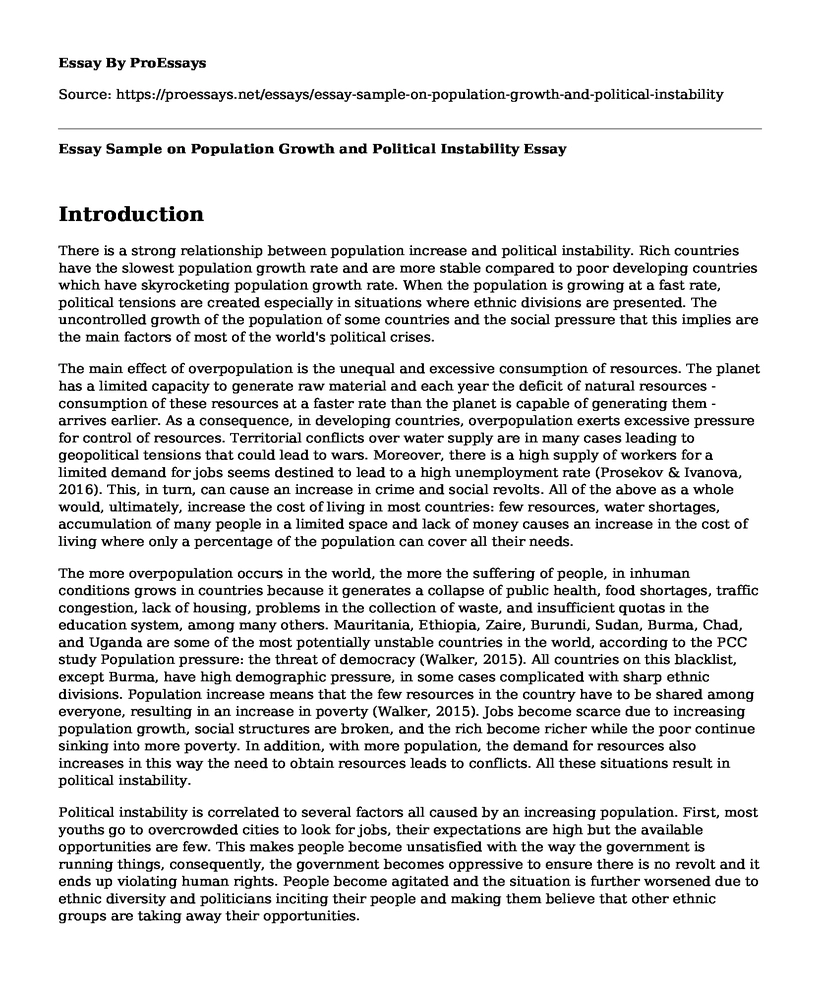Introduction
There is a strong relationship between population increase and political instability. Rich countries have the slowest population growth rate and are more stable compared to poor developing countries which have skyrocketing population growth rate. When the population is growing at a fast rate, political tensions are created especially in situations where ethnic divisions are presented. The uncontrolled growth of the population of some countries and the social pressure that this implies are the main factors of most of the world's political crises.
The main effect of overpopulation is the unequal and excessive consumption of resources. The planet has a limited capacity to generate raw material and each year the deficit of natural resources - consumption of these resources at a faster rate than the planet is capable of generating them - arrives earlier. As a consequence, in developing countries, overpopulation exerts excessive pressure for control of resources. Territorial conflicts over water supply are in many cases leading to geopolitical tensions that could lead to wars. Moreover, there is a high supply of workers for a limited demand for jobs seems destined to lead to a high unemployment rate (Prosekov & Ivanova, 2016). This, in turn, can cause an increase in crime and social revolts. All of the above as a whole would, ultimately, increase the cost of living in most countries: few resources, water shortages, accumulation of many people in a limited space and lack of money causes an increase in the cost of living where only a percentage of the population can cover all their needs.
The more overpopulation occurs in the world, the more the suffering of people, in inhuman conditions grows in countries because it generates a collapse of public health, food shortages, traffic congestion, lack of housing, problems in the collection of waste, and insufficient quotas in the education system, among many others. Mauritania, Ethiopia, Zaire, Burundi, Sudan, Burma, Chad, and Uganda are some of the most potentially unstable countries in the world, according to the PCC study Population pressure: the threat of democracy (Walker, 2015). All countries on this blacklist, except Burma, have high demographic pressure, in some cases complicated with sharp ethnic divisions. Population increase means that the few resources in the country have to be shared among everyone, resulting in an increase in poverty (Walker, 2015). Jobs become scarce due to increasing population growth, social structures are broken, and the rich become richer while the poor continue sinking into more poverty. In addition, with more population, the demand for resources also increases in this way the need to obtain resources leads to conflicts. All these situations result in political instability.
Political instability is correlated to several factors all caused by an increasing population. First, most youths go to overcrowded cities to look for jobs, their expectations are high but the available opportunities are few. This makes people become unsatisfied with the way the government is running things, consequently, the government becomes oppressive to ensure there is no revolt and it ends up violating human rights. People become agitated and the situation is further worsened due to ethnic diversity and politicians inciting their people and making them believe that other ethnic groups are taking away their opportunities.
References
Prosekov, A. Y., & Ivanova, S. A. (2016). Providing food security in the existing tendencies of population growth and political and economic instability in the world. Foods and Raw Materials, 4(2).
Walker, R. (2015). How to meet the challenges posed by population growth? Retrieved from https://www.devex.com/news/how-to-meet-the-challenges-posed-by-population-growth-86377 on 9th March 2019.
Cite this page
Essay Sample on Population Growth and Political Instability. (2022, Dec 01). Retrieved from https://proessays.net/essays/essay-sample-on-population-growth-and-political-instability
If you are the original author of this essay and no longer wish to have it published on the ProEssays website, please click below to request its removal:
- Social Change in the Community
- Why Teens Abuse Alcohol or Drugs Essay
- Planning For Your Future - Essay Sample
- Essay Example on Countering Violent Religious Extremism: Obama Addresses Nation
- Essay Sample on Majority Shareholders Dominating Minority: Legal Complications
- Essay on College Experiences Impact Learning Inequality: African-Americans vs Whites vs Asians
- Essay Example on Vaccines: The Key to Lower Mortality & Morbidity Rates







